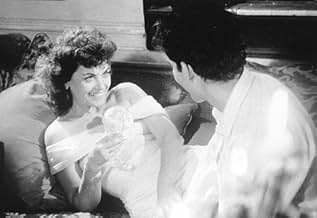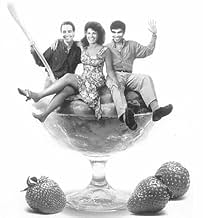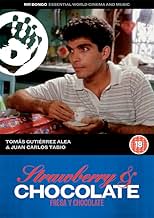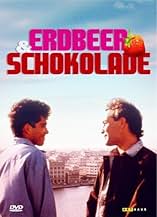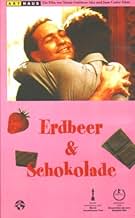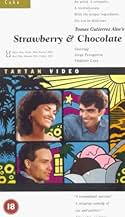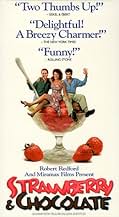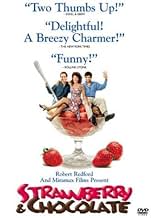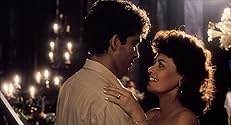VALUTAZIONE IMDb
7,4/10
6211
LA TUA VALUTAZIONE
Aggiungi una trama nella tua linguaStory of two men who are opposites: one gay, the other straight; one a fierce communist, the other a fierce individualist; one suspicious, the other accepting; and how they come to love each... Leggi tuttoStory of two men who are opposites: one gay, the other straight; one a fierce communist, the other a fierce individualist; one suspicious, the other accepting; and how they come to love each other.Story of two men who are opposites: one gay, the other straight; one a fierce communist, the other a fierce individualist; one suspicious, the other accepting; and how they come to love each other.
- Regia
- Sceneggiatura
- Star
- Candidato a 1 Oscar
- 25 vittorie e 2 candidature totali
Recensioni in evidenza
A beautiful movie for the heart. One of the most wonderful stories of friendship ever told.
Jorge Perugorría as Diego is amazing. (I'd well like to see some of his other work.) It is most astonishing to see how his character develops from the limp-wristed cliché gay at the beginning to a fascinating man who gets in conflict with the regime because he is different on every level from what the system requires him to be: he is an independent spirit, a person with a genuine love for the arts, for literature, for music, he is disappointed by communist ideals - and he is also gay, by the way.
Vladimir Cruz is also very fine as the young and naive David who discovers things through his friendship with Diego he'd never ever thought of: like discovering the beauty of things, of life, of poetry and music... And also being committed to another person, even though this person may seem very 'different' from oneself at first glance.
The development of David's and Diego's friendship is fascinating (I wouldn't interpret anything more into it, not even in the final scene). This is also a "coming of age" tale, in a way: by his friendship with Diego, David begins to think, develops a maturity of spirit - and is also, at last, able to develop a loving and mature relationship with a woman. It is very sweet when he tells Diego: "No-one will hurt her. She is with me."
A true gem of a film. I recommend it to everyone.
Jorge Perugorría as Diego is amazing. (I'd well like to see some of his other work.) It is most astonishing to see how his character develops from the limp-wristed cliché gay at the beginning to a fascinating man who gets in conflict with the regime because he is different on every level from what the system requires him to be: he is an independent spirit, a person with a genuine love for the arts, for literature, for music, he is disappointed by communist ideals - and he is also gay, by the way.
Vladimir Cruz is also very fine as the young and naive David who discovers things through his friendship with Diego he'd never ever thought of: like discovering the beauty of things, of life, of poetry and music... And also being committed to another person, even though this person may seem very 'different' from oneself at first glance.
The development of David's and Diego's friendship is fascinating (I wouldn't interpret anything more into it, not even in the final scene). This is also a "coming of age" tale, in a way: by his friendship with Diego, David begins to think, develops a maturity of spirit - and is also, at last, able to develop a loving and mature relationship with a woman. It is very sweet when he tells Diego: "No-one will hurt her. She is with me."
A true gem of a film. I recommend it to everyone.
10esh04676
I agree with all the positive things already so well put forth by other reviewers and say that I liked this film a lot. Jorge Perugorria is incredible as the slightly "queenie" gay man. I have seen him in other films where is so different, as a very macho truck driver, for instance. Here he is the art and book lover and appreciator of good food and drink, as well as attractive young men. His "education" of the stern young Cuban Communist (an excellent Vladimir Cruz), a very straight man with intense emotional animosity toward gays, becomes a study in the resolution of human relationships triumphing over social and political obstacles.The comradely embrace of the two men , symbolizing their understanding and acceptance of each other despite superficial differences, was a masterstroke at the end of this fine film.
one of films with status of experience. because it is a simple and precise pledge for discover the other. because it is a great friendship story. because it defines each totalitarian regime in its essence - especially Communism - in the right manner. and, not the last, for great performances. Jorge Perugorria is the fine example, his Diego being brilliant example of vulnerability, force and special form of wisdom. Vladimir Cruz, as the young man looking his sense/happiness, Galateea of a not ordinary Pygmalion, does an admirable work, too. and it is not fair to ignore Francisco Gattorno who has the chance to propose more than a character from the Latino soap opera area. "Fresa y chocolate" is one of films who must see twice. in strange way, for its beautiful simplicity. because it remains one of the most touching pledge for the courage to be yourself. and for the joy of life. and for authentic links between people. short, a real great film.
STRAWBERRY AND CHOCOLATE (Fresa y Chocolate)
Aspect ratio: 1.85:1
Sound format: Ultra-Stereo
Used as an unwitting pawn by his pro-revolutionary colleagues, a naive student (Vladmir Cruz) is encouraged to develop a platonic relationship with a flamboyant gay artist (Jorge Perugorria), whose political allegiances have fallen under suspicion. But as their friendship deepens, Cruz is transformed by Perugorria's resistance to the Cuban regime, even as the forces of oppression begin to close around them.
Based on a short story ('El Lobo, el Bosque y el Hombre Nuevo') by screenwriter Senel Paz, STRAWBERRY AND CHOCOLATE is a joyous celebration of life and non-conformity, distinguished by Perugorria's vivid performance as a self-proclaimed 'outsider' who rejects his friend's unquestioning loyalty to the Cuban political system that is stifling their beloved homeland. Their budding relationship is complicated by Perugorria's unrequited love for Cruz, depicted here with dignity and compassion, though it's their political differences which ultimately unite the two characters, even as Perugorria is forced to reap the whirlwind of his public defiance. Also starring Mirta Ibarra as Perugorria's flaky neighbor, who introduces virginal Cruz to the joys of sexual liberation! It isn't a terribly cinematic film, but production values are solid, and the characters are played with such integrity, it hardly matters; this is a movie in which ideas take precedence over action, and the emotional payoff is quite powerful indeed. Beautiful music score by Jose Maria Vitier, too. Directed by Tomás Gutiérrez Alea and Juan Carlos Tabío.
NB. The original US version (released by Miramax) is missing approximately six minutes of footage. Absent material includes a brief conversation about racism during Cruz's first visit to Perugorria's apartment, and a sad little sequence in which the two characters pretend not to notice each other after meeting by accident in a bookstore.
(Spanish dialogue)
Aspect ratio: 1.85:1
Sound format: Ultra-Stereo
Used as an unwitting pawn by his pro-revolutionary colleagues, a naive student (Vladmir Cruz) is encouraged to develop a platonic relationship with a flamboyant gay artist (Jorge Perugorria), whose political allegiances have fallen under suspicion. But as their friendship deepens, Cruz is transformed by Perugorria's resistance to the Cuban regime, even as the forces of oppression begin to close around them.
Based on a short story ('El Lobo, el Bosque y el Hombre Nuevo') by screenwriter Senel Paz, STRAWBERRY AND CHOCOLATE is a joyous celebration of life and non-conformity, distinguished by Perugorria's vivid performance as a self-proclaimed 'outsider' who rejects his friend's unquestioning loyalty to the Cuban political system that is stifling their beloved homeland. Their budding relationship is complicated by Perugorria's unrequited love for Cruz, depicted here with dignity and compassion, though it's their political differences which ultimately unite the two characters, even as Perugorria is forced to reap the whirlwind of his public defiance. Also starring Mirta Ibarra as Perugorria's flaky neighbor, who introduces virginal Cruz to the joys of sexual liberation! It isn't a terribly cinematic film, but production values are solid, and the characters are played with such integrity, it hardly matters; this is a movie in which ideas take precedence over action, and the emotional payoff is quite powerful indeed. Beautiful music score by Jose Maria Vitier, too. Directed by Tomás Gutiérrez Alea and Juan Carlos Tabío.
NB. The original US version (released by Miramax) is missing approximately six minutes of footage. Absent material includes a brief conversation about racism during Cruz's first visit to Perugorria's apartment, and a sad little sequence in which the two characters pretend not to notice each other after meeting by accident in a bookstore.
(Spanish dialogue)
`Strawberry and Chocolate' (1993)is set in contemporary Havana. The luster of that city has dimmed after nearly four decades of Castro's rule. David (Vladimir Cruz), a student and avid Castro supporter, is on the rebound after losing his girlfriend. He had taken her to a cheap hotel to make love, but the place is so shabby it puts her off. Instead, he promises never to touch her until they marry. In the next scene, she marries someone else while David stands sullenly among the well wishers at the registry office. Then he meets Diego (Jorge Perugorría).
Diego, who is flamboyantly gay, parks himself at David's table in an outdoor café to eat a dish of strawberry ice cream. For David, this is suspicious because chocolate is also available. Diego says some people like chocolate, some like strawberry, an innocuous line that gives the movie its title and also hints at the odd couple relationship to follow.
Diego does not disguise his sexual interest in David, but is also interested in giving David an education the regime denies him. The older man is far more cultured than his new friend. Offers of books banned in Castro's Cuba, such as a novel by Mario Vargas Llosa or the poems of John Donne, lure David to his apartment for tea and talk. When David reports that Diego is involved with a forbidden art exhibit, he is directed to befriend Diego to find out more information. `Strawberry and Chocolate' thus sets their emerging friendship against the backdrop of two bleak themes: anti-gay prejudice in the Castro regime, and the betray-thy-neighbor expectation of a police state.
But almost nobody conforms to type. A woman in Diego's building who is part of the neighborhood Vigilance Committee, on the watch for counter-revolutionary activities, turns out to be a good friend to Diego and then to David. Everyone plays one game with the government, but a different one in their private lives. This is a lesson David has to learn. Encounters with women along the way provide a few subplots, but the heart of the story lies in the hearts of the two men.
`Strawberry and Chocolate' is credited to directors Tomás Gutiérrez Alea and Juan Carlos Tabío. The former was, until his death shortly after completing this film, the best known filmmaker in Cuba, winning an international reputation in the 1960's for titles such as `Memoirs of Underdevelopment,' a look at life in Cuba in the early Castro years that tempers criticism with prudence. `Strawberry' is smaller in scale and less overtly political.
The film was nominated for an Oscar in 1995 and won awards at film festivals around the world (including the Sundance Festival). American viewers may instantly slot it with Hollywood features that show how straight characters learn life lessons from a wiser gay companion (`Boys on the Side,' `As Good As It Gets'). And at times Diego's excesses recall the worst performances of Harvey Fierstein. Yet superb performances by the two male leads eventually move beyond stereotypes they and the audience initially share about each other, transforming their unexpected friendship into a statement that puts the lie to official groupthink in a repressive regime.
Diego, who is flamboyantly gay, parks himself at David's table in an outdoor café to eat a dish of strawberry ice cream. For David, this is suspicious because chocolate is also available. Diego says some people like chocolate, some like strawberry, an innocuous line that gives the movie its title and also hints at the odd couple relationship to follow.
Diego does not disguise his sexual interest in David, but is also interested in giving David an education the regime denies him. The older man is far more cultured than his new friend. Offers of books banned in Castro's Cuba, such as a novel by Mario Vargas Llosa or the poems of John Donne, lure David to his apartment for tea and talk. When David reports that Diego is involved with a forbidden art exhibit, he is directed to befriend Diego to find out more information. `Strawberry and Chocolate' thus sets their emerging friendship against the backdrop of two bleak themes: anti-gay prejudice in the Castro regime, and the betray-thy-neighbor expectation of a police state.
But almost nobody conforms to type. A woman in Diego's building who is part of the neighborhood Vigilance Committee, on the watch for counter-revolutionary activities, turns out to be a good friend to Diego and then to David. Everyone plays one game with the government, but a different one in their private lives. This is a lesson David has to learn. Encounters with women along the way provide a few subplots, but the heart of the story lies in the hearts of the two men.
`Strawberry and Chocolate' is credited to directors Tomás Gutiérrez Alea and Juan Carlos Tabío. The former was, until his death shortly after completing this film, the best known filmmaker in Cuba, winning an international reputation in the 1960's for titles such as `Memoirs of Underdevelopment,' a look at life in Cuba in the early Castro years that tempers criticism with prudence. `Strawberry' is smaller in scale and less overtly political.
The film was nominated for an Oscar in 1995 and won awards at film festivals around the world (including the Sundance Festival). American viewers may instantly slot it with Hollywood features that show how straight characters learn life lessons from a wiser gay companion (`Boys on the Side,' `As Good As It Gets'). And at times Diego's excesses recall the worst performances of Harvey Fierstein. Yet superb performances by the two male leads eventually move beyond stereotypes they and the audience initially share about each other, transforming their unexpected friendship into a statement that puts the lie to official groupthink in a repressive regime.
Lo sapevi?
- QuizCuba's official submission to the Best Foreign Language Film category for the 67th Academy Awards. As of 2020, it remains the only Cuban film to be nominated for an Oscar.
- BlooperThe blue Cadillac seen at the end of the film was not made until the 1987 model year.
I più visti
Accedi per valutare e creare un elenco di titoli salvati per ottenere consigli personalizzati
- How long is Strawberry & Chocolate?Powered by Alexa
Dettagli
Botteghino
- Lordo Stati Uniti e Canada
- 2.080.805 USD
- Lordo in tutto il mondo
- 2.087.569 USD
- Tempo di esecuzione1 ora 48 minuti
- Colore
- Mix di suoni
- Proporzioni
- 1.85 : 1
Contribuisci a questa pagina
Suggerisci una modifica o aggiungi i contenuti mancanti

